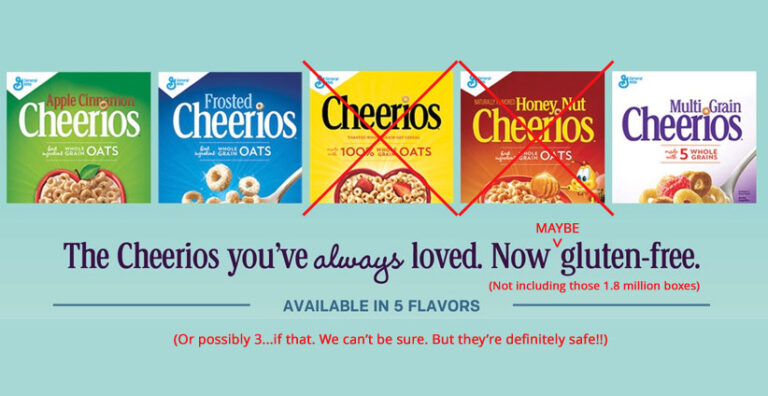
Rebecca Cross, a San Francisco-based attorney at law firm BraunHagey & Borden LLP, added: "It is common for a company to be sued following a recall of this size – even where the issue was inadvertent and it acts promptly to correct. It will be hard for plaintiffs to get the case certified as a class action
CHEERIO GLUTEN FREE RECALL FREE
Acknowledging wrong doing does not free a corporation from liability for damages." "If the plaintiffs can prove their allegations, General Mills will still be liable for damages under state law, even though it promptly recalled the product. he said: "The naming of an individual as a defendant in a lawsuit against a major corporation is a litigation tactic, the relevance of which will become more known as the case proceeds. We’ve also instituted additional flour handling protocols at all facilities to ensure this will not happen again.”Īttorney: Acknowledging wrong doing does not free a corporation from liability for damagesĪsked whether the fact that General Mills had behaved quickly and responsibly as soon as it became aware of the contamination would have any bearing on the case, Bruce Silverglade, principal at law firm Olsson Frank Weeda Terman Matz PC, told FoodNavigator-USA: "Even if a company promptly conducts a recall, it is likely to be the target of food safety lawsuits if the plaintiffs can prove damages."Īs for why the plaintiffs had named a specific individual (Rozanne Ornelas) in the lawsuit as well as General Mills Inc. He added: “ We are testing all finished products. We also tested the specific oat flour being used at Lodi – and our oat flour supply also tested as gluten free on the dates in question.”

He also reassured consumers that the company’s oat supply was “not the issue”, stressing: “ We tested our oat supply on these dates – and the oat supply tested as gluten free. That error resulted in an undeclared allergen – wheat – being present in products labeled as gluten free at levels above the FDA gluten-free standard.” In an isolated incident involving purely human error, wheat flour was inadvertently introduced into our gluten-free oat flour system at Lodi. He explained: “ Our Lodi production facility lost rail service for a time and our gluten-free oat flour was being off-loaded from rail cars to trucks for delivery to our facility on the dates in question.

In a blog post published on October 5, Jim Murphy, senior vice president and president of the Cereal division at General Mills, said he was ” embarrassed and truly sorry” about an “ isolated incident involving purely human error”, which led to the recall. The lawsuit was filed just under a month after General Mills announced plans to voluntarily recall 1.8m boxes of gluten-free Cheerios and Honey Nut Cheerios produced at its Lodi plant in California in July ( click HERE for details). 'An isolated incident involving purely human error' It adds: “ Plaintiffs and Class Members have all suffered and will continue to suffer harm and damages as a result of Defendants’ unlawful and wrongful conduct.” In a complaint* filed in the eastern district of California on October 30 by plaintiffs Keri van Lengen and Deborah Nava against General Mills and Roxanne Ornelas (manufacturing manager at Gen Mill’s Lodi plant), General Mills is accused of selling misbranded products (cereals advertised as gluten-free which in fact contained gluten). Packaging & Packing Materials, Containers.Processing Equipment & Systems, Automation, Control.Filling & Packaging Equipment & Systems.The company investigated the complaints and tested the cereals. Spokesman Tom Forsythe said that as of Monday the company had received two reports of illness related to the gluten-free Cheerios produced at the California plant. General Mills said Cheerios produced at other plants were unaffected. The protein can sicken people with wheat allergies, celiac disease or gluten intolerance. The company launched gluten-free Cheerios earlier this year, after developing a process designed to keep grains containing gluten separate from oats, which do not. General Mills says wheat flour was inadvertently introduced into the production process at a California plant for about two weeks in July. The company determined the Cheerios could be contaminated with wheat, which contains gluten. The complaints helped prompt General Mills to recall 1.8 million boxes of Cheerios and Honey Nut Cheerios Monday. The federal agency said it is not aware of any hospitalizations or deaths.

Most people complained about gastrointestinal discomfort. Food and Drug Administration has received 125 reports of people becoming ill after eating Cheerios labeled gluten-free.


 0 kommentar(er)
0 kommentar(er)
